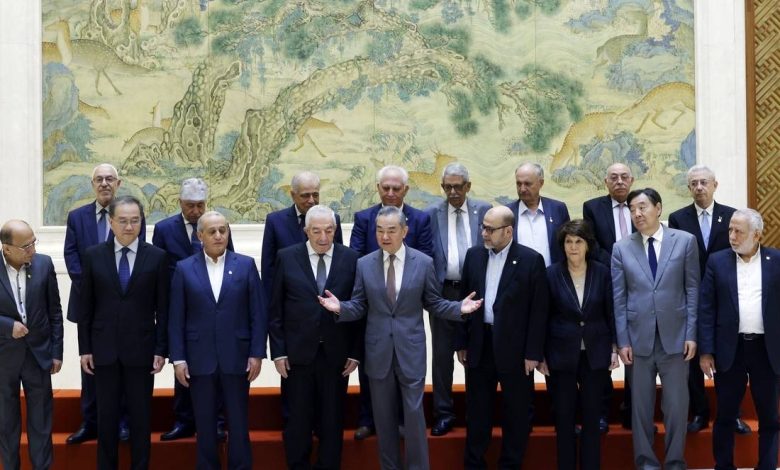What China hopes to achieve in the Middle East through Hamas-Fatah talks?

TRT
Leaders of Hamas and Fatah, Palestine’s two main political factions, announced their readiness to unite after decades of dispute during a much-publicised meeting in China earlier this week.
By signing the “Beijing Declaration”, the two parties agreed to end historic political divisions and strengthen Palestinian “national unity”.
The summit in Beijing also included 12 other Palestinian factions, as part of the China-led reconciliation efforts that began with an initial yet inconclusive meeting held in Beijing in April.
While questions persist about the reliability and sustainability of the significant deal, which could mean Palestinians finally have a strong and united leadership, it’s China’s role as peacemaker that has drawn global attention.
Following its role in facilitating an agreement between Iran and Saudi Arabia in March 2023, two nations with a long-standing rivalry, China’s involvement in efforts to achieve Palestinian unity—potentially as a precursor to a two-state solution with Israel—could further solidify its emerging role as a reliable mediator.
Dogan explains that the Asian country’s outreach to the Middle East, which began in late 2022 with efforts to establish new partnerships with countries such as the United Arab Emirates and Saudi Arabia, was significant.
“It aimed to involve regional leaders in what it termed the ‘Chinese Century’. However, the outbreak of the Israel-Palestine conflict disrupted this process,” Dogan adds.
While China’s Middle Eastern policy once sought economic benefit, putting aside political entanglements in the early 21st century, Sun says that the country shifted its regional policy and is now ready to “project not only its hard economic power but also its soft diplomatic power”.
Stabilising the Middle East is crucial for China, particularly given its investments in the Belt and Road Initiative, the billion-dollar global infrastructure project which links the Asian nation to the rest of the world via the Middle East.
A unified Palestinian leadership is a crucial step toward achieving peace and ideally ending Israel’s genocidal war in Gaza, which has persisted for over 10 months and claimed almost 40,000 lives, and the 76 years of illegal Israeli occupation of Palestinian lands.
However, achieving this unity has been proven challenging due to deep-seated differences between the factions.
Fatah, the main faction of the Palestine Liberation Organization (PLO), has held partial control over the Palestinian territories in the occupied West Bank since the Oslo Accords were signed in 1993. Hamas, a political organisation with an armed resistance wing Qassam Brigades, has governed Gaza since 2007 after winning legislative elections in 2006.
While the Fatah-led PLO is the only group that has been allowed to represent the Palestinian people at the United Nations since 1974, when it was
conferred observer status under the leadership of Yasser Arafat, Hamas has long been dismissed as a “terrorist group” by some members such as the UK, US, and Canada.
The rift between these two predates the elections, resulting in an armed conflict in 2006, and is primarily rooted in political and ideological differences.
Many believe that the American administration has lost credibility due to its unwavering support for Israel and its inability to influence an end to the bloody war since October 7. But its declining image goes back even further to the 1990s Gulf War, says regional expert Dogan.



